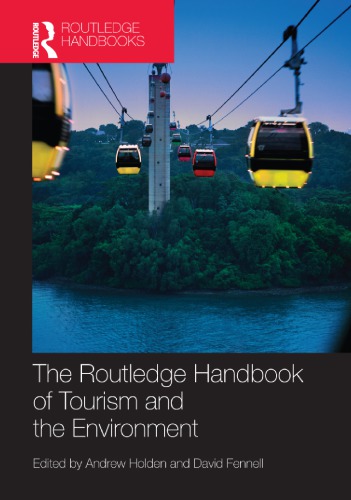

Most ebook files are in PDF format, so you can easily read them using various software such as Foxit Reader or directly on the Google Chrome browser.
Some ebook files are released by publishers in other formats such as .awz, .mobi, .epub, .fb2, etc. You may need to install specific software to read these formats on mobile/PC, such as Calibre.
Please read the tutorial at this link: https://ebookbell.com/faq
We offer FREE conversion to the popular formats you request; however, this may take some time. Therefore, right after payment, please email us, and we will try to provide the service as quickly as possible.
For some exceptional file formats or broken links (if any), please refrain from opening any disputes. Instead, email us first, and we will try to assist within a maximum of 6 hours.
EbookBell Team

4.1
50 reviewsThe Routledge Handbook of Tourism and the Environment explores and critically evaluates the debates and controversies inherent to tourism’s relationship with nature, especially pertinent at a time of major re-evaluation of our relationship with the environment as a consequence of the environmental problems we now face. It brings together leading specialists from range of disciplinary backgrounds and geographical regions, to provide state-of-the-art theoretical reflection and empirical research on this complex relationship and future direction.
The book is divided in to five interrelated sections. Section one evaluates the philosophical basis, rationale and complexity of what is meant by the term ‘environment’ considering the major influences in the construction of how we understand our surroundings and the types of values we place upon them. Section two evaluates the types of eco-systems that are used as natural resources for tourism and the negative and positive impacts upon them. Section three evaluates relevant environmental policy and management mechanisms for the impacts of tourism on the natural environment. Section four focuses on the changing tourism-environment relationship, and the types of tourism that have become established in the tourism industry, market and policy. Section five, analyzes contemporary and future issues of the tourism-environment relationship, based upon themes of environmental and social welfare.
This timely book will provide an invaluable resource for all those with an interest in tourism’s relationship with the natural environment, encouraging dialogue across disciplinary boundaries and areas of study. The book is international in its focus, emphasizing that issues of tourism and the natural environment are not only localized but transcend national boundaries that sometimes require both international and global responses. This is essential reading for student, researchers and academics of Tourism as well as those of Geography, Environmental Studies and Development Studies.